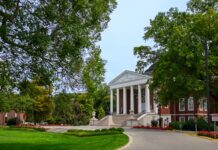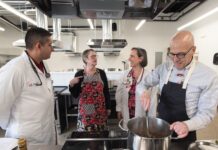“I think that you can pick up a newspaper or magazine and without much effort, see that we are affected by things on a global level,” said Pam Curtis, director of the Office of Civic Engagement, Leadership and Service.
Participating students came from all points of the globe, including the United States. Over the two-day period, they learned about their own strengths as leaders, while Curtis and her team members gained insight into the kind of programming UofL should provide for international students.
“It was amazing,” Curtis said. “The feedback has been amazing about what they experienced. They were able to get to know one another in very meaningful ways.”
The Global Leaders Program retreat provided an opportunity for students to explore key concepts and challenges of leadership in domestic and international contexts, with a special focus on cross-cultural communication and team building. Students gained an understanding of the most important concepts in goal setting and success and reflected on their strengths and areas for growth.
Rasitha Kodippuli Thanthillage Dona was one of the participants. Originally from Sri Lanka, the doctoral student has been in the United States for four months. This was the first time she attended a meeting with participants representing so many different international cultures.
“If you map the world, we had people from Canada to South America, South Africa, Germany, representation from all around the world. It was a great experience,” she said, adding that students were able to exchange ideas from their own cultures with one another to better the group and that she was able to identify ways to better herself as a leader and communicator.
One exercise had the group divided at several tables with a card game at each. Participants switched tables as part of the exercise, but didn’t know that the card game rules differed among the tables. They had to learn new rules each time they moved.
The game was analogous to moving from one country to another.
Although it was interesting in itself, the discussion that followed made the experience even stronger, Curtis said. The assumptions we make across cultures became all too clear during this activity and the group explored strategies for better understanding.
“We talked about how the world is getting smaller with technology. Being able to function as a leader and develop basic leadership skills, you must be able to recognize that what it means to be a leader in your country may be different in another country. We have to learn the strategies to learn how to work across borders and barriers, especially cultural ones, Curtis said.
Participants also completed an online assessment called Strengths Quest to help them identify their talents. Then they learned how to take their strengths and use them to improve as a cross cultural communicator.
“These are tools that will make you a more marketable employee, certainly make you a better citizen in the very grandest sense of the word, Curtis explained.
Curtis and Gerome Stephens of the Office of Civic Engagement, Leadership and Service; Michael Anthony and Laina Lopez of the Cultural Center; and Kim Buckner of the Dean of Students Office developed the Global Leaders Program concept earlier this fall.
Creating a leadership program geared to international students was a priority for Tom Jackson, vice president for student affairs, who believed there was a gap in programming there that needed to be filled, Curtis said.
Applicants ranged from freshmen to doctoral candidates. The retreat was free to participants through funding from the Division of Student Affairs.
The experience was positive and the planning group hopes to grow the program in the future based on participant feedback, she said. “It was one of the best student experiences I’ve had in 20 years of doing this job.”



























